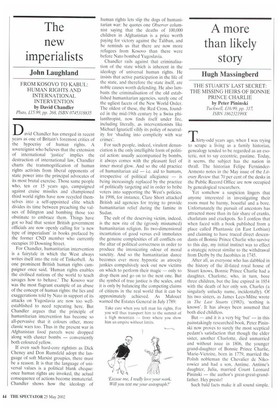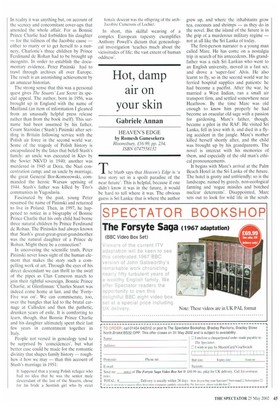A more than likely story
Hugh Massingberd
THE STUARTS' LAST SECRET: THE MISSING HEIRS OF BONNIE PRINCE CHARLIE by Peter Pininski
Tucicwell, £16.99, pp. 317, ISBN 186232199X
Thirty-odd years ago. when I was trying to scrape a living as a family historian, genealogy tended to be regarded as an esoteric, not to say eccentric, pastime. Today, it seems, the subject has the nation in thrall. The historian Felipe FernandezArmesto notes in the May issue of the Literal), Review that 70 per cent of the desks in the Public Record Office are now occupied by genealogical researchers.
Yet somehow a suspicion lingers that anyone interested in investigating their roots must be barmy, boastful and a bore. Unfortunately the pursuit of ancestors has attracted more than its fair share of cranks, charlatans and crackpots. So I confess that when faced with a book published from a place called Phantassie (in East Lothian) and claiming to have traced direct descendants of Bonnie Prince Charlie who survive to this day, my initial instinct was to effect a strategic retreat similar to the withdrawal from Derby by the Jacobites in 1745.
After all, as everyone who has dabbled in the history of the ill-fated royal house of Stuart knows, Bonnie Prince Charlie had a daughter, Charlotte, who, in turn, bore three children, but the line expired in 1854 with the death of her only son. Charles (a singularly unlucky name, incidentally). Of his two sisters, as James Lees-Milne wrote in The Last Stuarts (1983), 'nothing is known'. It has always been assumed that both died childless.
But — and it is a very big 'bur — in this painstakingly researched book, Peter Pininski now proves to surely the most sceptical pedant's satisfaction that though the elder sister, another Charlotte, died unmarried and without issue in 1806, the younger grand-daughter of Bonnie Prince Charlie, Marie-Victoire, born in 1779, married the Polish nobleman the Chevalier de Nikorowicz and had a son, Antime. Antime's daughter, Julia, married Count Leonard Pininski — the author's great-great-grandfather. Hey presto!
Such bald facts make it all sound simple. In reality it was anything but, on account of the secrecy and concomitant cover-ups that attended the whole affair. For as Bonnie Prince Charlie had forbidden his daughter — for the tidiness of the Jacobite cause — either to marry or to get herself to a nunnery, Charlotte's three children by Prince Ferdinand de Rohan had to he brought up incognito. In order to establish the documentary evidence, Peter Pininski had to trawl through archives all over Europe. The result is an astonishing achievement by an amateur historian.
The strong sense that this was a personal quest gives The Stuarts' Last Secret its special appeal. The author, born in 1956, was brought up in England with the name of Maitland (an item of information I gleaned from an unusually helpful press release rather than from the book itself). This surname had been assumed by his father, Count Stanislas (`Stash') Pininski after settling in Britain following service with the Polish air force in the second world war. Some of the tragedy of Polish history is encapsulated by the fates that befell Stash's family: an uncle was executed in Kiev by the Soviet NKVD in 1940; another was murdered in 1945 at Dora. the Nazi concentration camp; and an uncle by marriage, the great General Bor-Komorowski, commanded the heroic Warsaw uprising of 1944. Stash's father was killed by Tito's communists in Yugoslavia.
Fascinated by the past, young Peter resumed the name of Pininski and returned to live in Poland. Then, in 1997, he happened to notice in a biography of Bonnie Prince Charlie that his only child had borne three natural children by Prince Ferdinand de Rohan, The Pininskis had always known that Stash's great-great-great-grandmother was the natural daughter of a Prince de Rohan. Might there be a connection?
In uncovering the scientific truth, Peter Pininski never loses sight of the human element that makes the story such a compelling work of art. Through the eyes of his direct descendant we can thrill to the swirl of the pipes as Clan Cameron march to join their rightful sovereign, Bonnie Prince Charlie. at Glenfinnan: 'Charles Stuart was indeed come home at last, and the 'FortyFive was on'. We can commiserate, too, over the bungles that led to the brutal carnage at Culloden and then the pathetic, drunken years of exile. It is comforting to learn, though, that Bonnie Prince Charlie and his daughter ultimately spent their last few years in contentment together in Italy.
People not versed in genealogy tend to be surprised by 'coincidences', but what better case could be made for the romantic divinity that shapes family history — roughhew it how we may — than this account of Stash's marriage in 1951:
It happened that a young Polish refugee who had no idea that he was the senior male descendant of the last of the Stuarts, chose for his bride a Scottish girl who by strict
female descent was the offspring of the archJacobite Camerons of Lochiel.
In short, this skilful weaving of a complex European tapestry exemplifies Anthony Powell's dictum that geneaological investigation 'teaches much about the vicissitudes of life; the vast extent of human oddness'.























































































 Previous page
Previous page